Sustainable Development
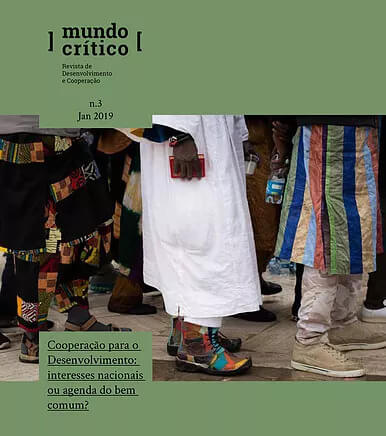
Mundo Crítico n.º 3: Cooperação para o Desenvolvimento: interesses nacionais ou agenda do bem comum?
Abstract:
This third edition of Mundo Crítico explores some of the pressing questions facing development cooperation today, both internationally and nationally. It aims to contribute to a diverse and multi-voiced portrait of a reality undergoing significant changes — conceptually, politically, and in practice — changes that may even challenge the very notion of cooperation as a core value in relations between geographic, political, and cultural spaces. The reasons behind the current turbulent times clearly extend beyond development cooperation itself, but the failure of certain models, or the inadequacy of others, in addressing contemporary challenges has led to their reevaluation within the broader scope of foreign policies in various states. This edition seeks to look to the future, contributing not only to a forward-looking reflection but also to a debate on the current state of Development Cooperation. It questions models, strategies, and narratives, aiming for political choices that we, as a society, can collectively identify with.
The issue begins with an “imperfect conversation”, adopting a critical tone, about the current trends in Development Cooperation and the pressing need to build sustainable local capacities. The “Knowledge and Circumstances” dossier opens with Six Questions on Portuguese Cooperation, a reflection by the Editorial Board aimed at fostering the necessary (and urgent) debate within the sector. The section features articles on diverse perspectives and approaches, including those of countries like China and Norway, recent decisions by Portuguese Cooperation regarding Official Development Assistance, and a reflection on the professionals of the “development industry,” the non-governmental sector in the PALOP countries, and the changes and actions of NGOs in Angola. Additionally, the issue includes an article on women in comics, opening pathways for cooperation and solidarity.
The “Ways of Seeing” section focuses on migration to Europe through the lens of Italian photographer Mario Badagliacca, showcasing objects brought by migrants landing in Lampedusa. The Narratives section presents two journalistic works: one on the Jamaica neighborhood in Portugal and another on a reunion in Ethiopia following the peace agreement with Eritrea.
We revisit the “Innovations” section (introduced in the first issue), with examples of processes promoting human rights in Guinea-Bissau and within the CPLP, as well as cooperation in education between Portugal and Mozambique. The edition concludes with “Ecos Gráficos”, featuring comics, and a curated selection of reading suggestions in Escaparate focused on the current state of Development Cooperation.
Cite this Journal:
ACEP & CEsA (2019). “Cooperação para o Desenvolvimento: interesses nacionais ou agenda do bem comum?”. ISEG/CEsA – Centro de Estudos sobre África e Desenvolvimento. Revista Mundo Crítico nº 3 (Jan 2019). ISSN 2184-1926.
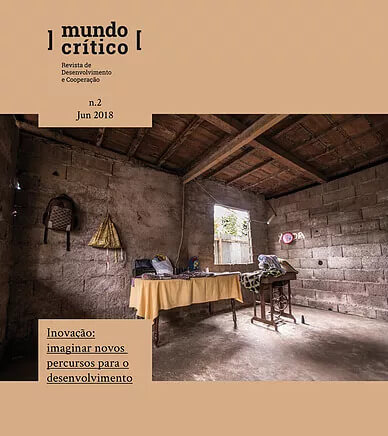
Mundo Crítico n.º 2: Inovação: imaginar novos percursos para o desenvolvimento
Abstract:
What is “new” in “innovation and development”? This question served as the starting point for the challenge we posed in this second edition of Mundo Crítico, aiming to intersect diverse practices, experiences, and perspectives on the “innovation” agenda within international development cooperation.
Perhaps the greatest potential of the international “innovation and development” agenda lies in questioning the dichotomous logics that permeate relationships between “developed countries” and “developing countries.” These dynamics often conceive the former as spaces of “invention, recreation, or renewal” of theories, technologies, or organizational models, and the latter as mere recipients, importing products, values, and ideas. In light of the transformations in the world we live in and the uncertainties surrounding its direction and impacts, it becomes imperative to question what is truly “new” in “innovation and development”—recovering memory, observing the present, and daring to glimpse the future.
This edition begins with an “Imperfect Conversation” about the various dimensions of innovation, which go far beyond mere technological aspects. Social innovation must be accompanied by organizational innovation, fostering a process-oriented approach for truly inclusive and change-oriented development. In the dossier of “Knowledge and Circumstances”, reflective articles explore experiences and practices of innovation for development, including initiatives in creative economies in countries like Cape Verde, Guinea-Bissau, and São Tomé and Príncipe; cash transfers in humanitarian aid contexts; and a project to improve the quality of education in Latin America through school lighting, to name just a few examples. The “Ways of Seeing” section features a photographic dossier showcasing the faces of women from São Tomé and Príncipe, resulting from a project affirming the rights of Santomean women. The “Narratives” section presents practical cases and protagonists who leverage innovation and creativity to tackle diverse challenges.
Finally, we introduce a new section — Ecos Gráficos — dedicated to comics, as well as Escaparate, which serves as a gateway to further readings.
Cite this Journal:
ACEP & CEsA (2018). “Inovação: imaginar novos percursos para o desenvolvimento”. ISEG/CEsA – Centro de Estudos sobre África e Desenvolvimento. Revista Mundo Crítico nº 2 (Jun 2018). ISSN 2184-1926.
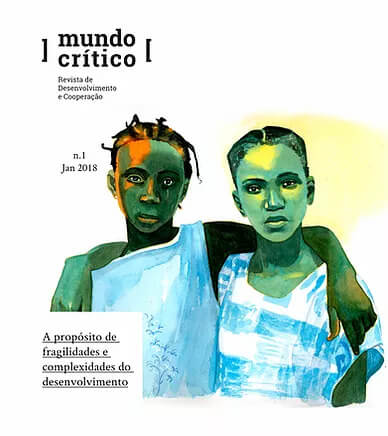
Mundo Crítico n.º 1: A propósito de fragilidades e complexidades do desenvolvimento
Abstract:
In an era of multiple challenges, spanning from the local to the global scale, Mundo Crítico – Journal of Development and Cooperation seeks to address the need for debate among public and private social actors, regardless of their size or geographic and thematic scope, with a critical, persistent, and dialogical commitment. It aims to foster unlikely dialogues between text and image, between art and science, between academics, artists, and practitioners, and among Portuguese-speaking individuals from diverse geographical and cultural spaces. The debate aspires to be comprehensive, with a particular focus on the ongoing social, economic, and political transformations shaping the world we inhabit.
The guiding principle of this platform is rooted in a vision of development as a multidisciplinary social action and the complementarity of various actors, both individual and collective. It considers cooperation among peoples as one of the pillars upon which a shared vision of human rights, well-being, and progress for humanity—both today and for future generations—can be built. A journal of critical thinking to reflect and act.
Cite this Journal:
ACEP & CEsA (2018). “A propósito de fragilidades e complexidades do desenvolvimento”. ISEG/CEsA – Centro de Estudos sobre África e Desenvolvimento. Revista Mundo Crítico nº 1 (Jan 2018). ISSN 2184-1926.
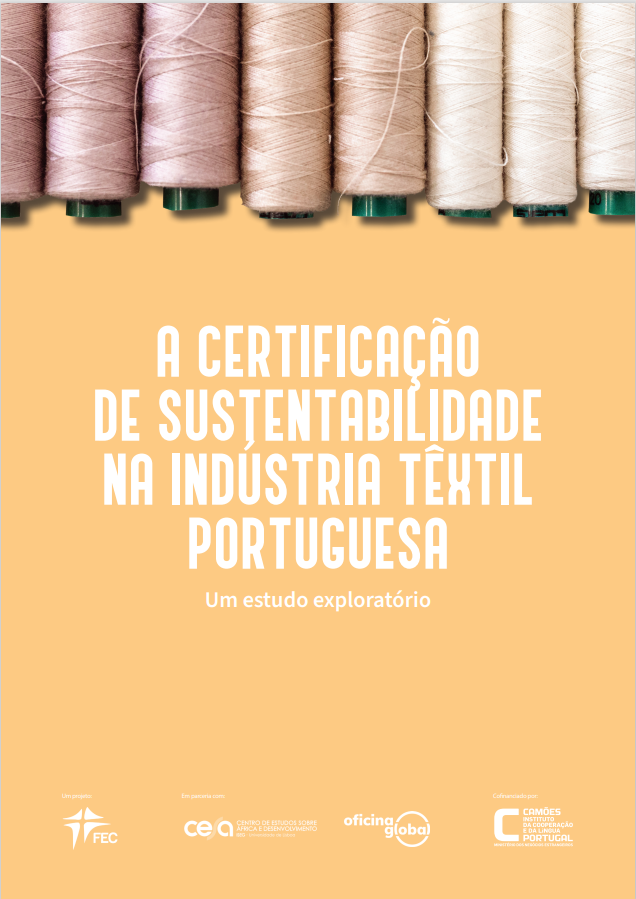
A certificação de sustentabilidade na Indústria Têxtil Portuguesa: um estudo exploratório
Abstract:
This study analyzes sustainability certification in the Portuguese textile industry. The main objective is to map the current landscape of sustainable practices adopted by this crucial sector of the Portuguese economy, evaluating the implications, challenges, and benefits of certification in the contemporary economic and environmental context. We aim to understand how sustainability certifications can serve as a strategic tool to boost the competitiveness of Portuguese companies in the global market, responding to the growing demand for ethical and environmentally conscious products.
The methodology employed in this study involves a review of the existing literature on sustainability in the textile industry. Essentially, it is a hybrid and comparative analysis, utilizing the complete universe of certified Portuguese textile companies. While this focused approach does not answer all questions, it allows this study to take a small step towards research committed to supporting companies that, despite clear risks and costs, choose to invest in sustainability. It also addresses the societal pressure that can and should be exerted on legislators to implement stronger regulatory frameworks and on companies that decide not to invest in sustainability.
This is a small step we hope will lead to further research efforts. We offer a perspective on the role of sustainability certification as a competitive differentiator for the Portuguese textile industry. The study emphasizes the growing importance of sustainability as a selection criterion for consumers and international business partners, reinforcing the need for Portuguese companies to continue investing in sustainable practices and obtaining certifications that validate their efforts. The study also presents and discusses recommendations for future policies and strategies, aiming to strengthen Portugal’s position as a leader in sustainable textile production on the global stage.
Cite this ebook:
Bernardo, Luís Pais (2024). A certificação de sustentabilidade na Indústria Têxtil Portuguesa : um estudo exploratório. Lisboa: Oficina Global.
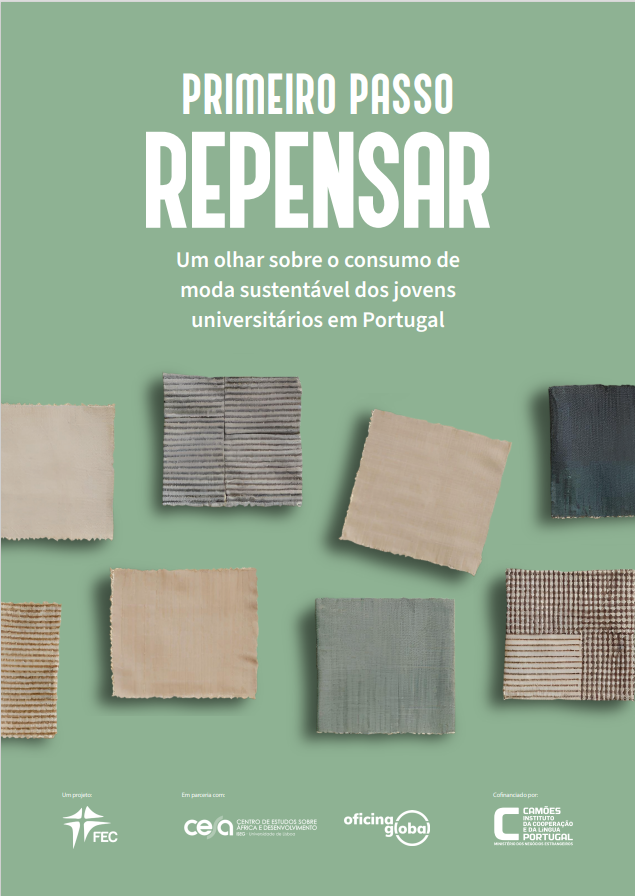
Primeiro Passo Repensar: Um olhar sobre o consumo de moda sustentável dos jovens universitários em Portugal
Abstract:
Sustainable fashion consumption involves conscious choices in purchasing, using/maintaining, and disposing of each clothing item. Therefore, it is important to Rethink, Reject, Reduce, Repair, Reuse, and Recycle. This study aimed to understand the behaviors and environmental awareness of university students living in Portugal during the three main phases of fashion consumption. An online questionnaire survey was conducted among 271 university students aged 18 to 26. The survey was open for responses from June 15 to July 24, 2023.
Cite this ebook:
Silva, Ana Luísa e Renata Assis (2024). Primeiro passo repensar: um olhar sobre o consumo de moda sustentável dos jovens universitários em Portugal. Lisboa: FEC | Fundação Fé e Cooperação e CEsA/ISEG-UL.
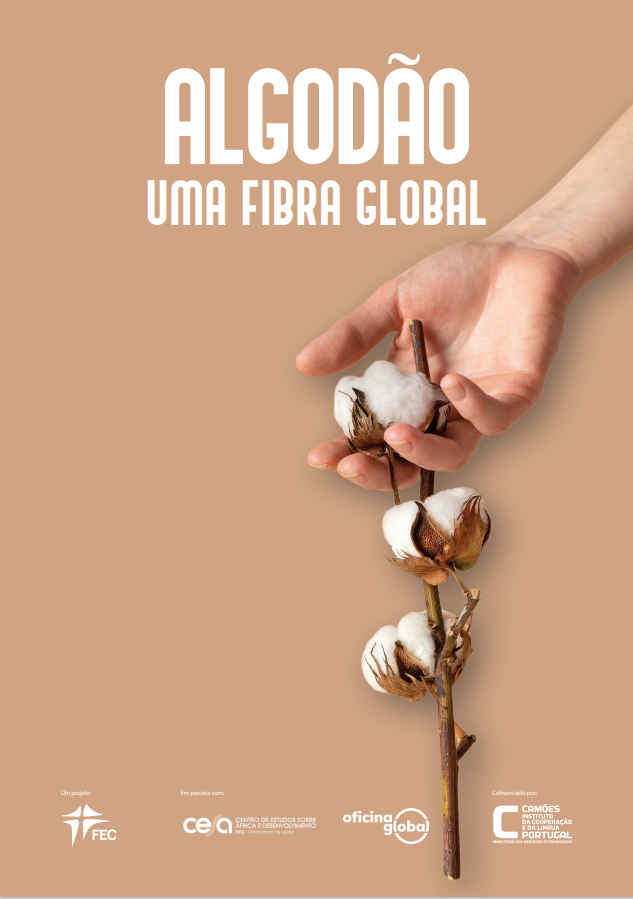
Algodão, uma fibra global
Abstract:
Cotton doesn’t lie. This well-known idiom in Portugal highlights how the most important natural fiber — both historically and commercially — has woven itself into our lives. Yet, while cotton doesn’t deceive, it does conceal. It’s more than just a fiber; it’s an entire global industry. It shapes production and consumption patterns, directly impacting the lives of millions worldwide. Cotton influences the fate of soils and water sources and significantly affects the environment. It encompasses agriculture, fashion, and high technology. Cotton has a complex and often troubling history: it can be sweet, but it’s also bitter. Its soft touch belies the complexity of its life cycle, which spans from cotton fields in Burkina Faso to garment factories in Bangladesh, fashion runways in Milan, and algorithms in New York. This distribution isn’t arbitrary: the value gap —evident in the income disparity between a field worker in Burkina Faso, a factory manager in Bangladesh, and a top designer in Milan — illustrates global inequalities. Cotton connects these diverse landscapes and activities. This briefing is for anyone who wants to understand the fashion they wear and the fibers they choose. It’s also for decision-makers regulating cotton production and consumption. Responsible consumption is a key step in altering economic structures, but it’s rarely enough on its own. Our aim is clear: meaningful action requires clarity, knowledge, and information.
Cite this ebook:
Bernardo, Luís Pais (2023). Algodão, uma fibra global. Lisboa: FEC | Fundação Fé e Cooperação.
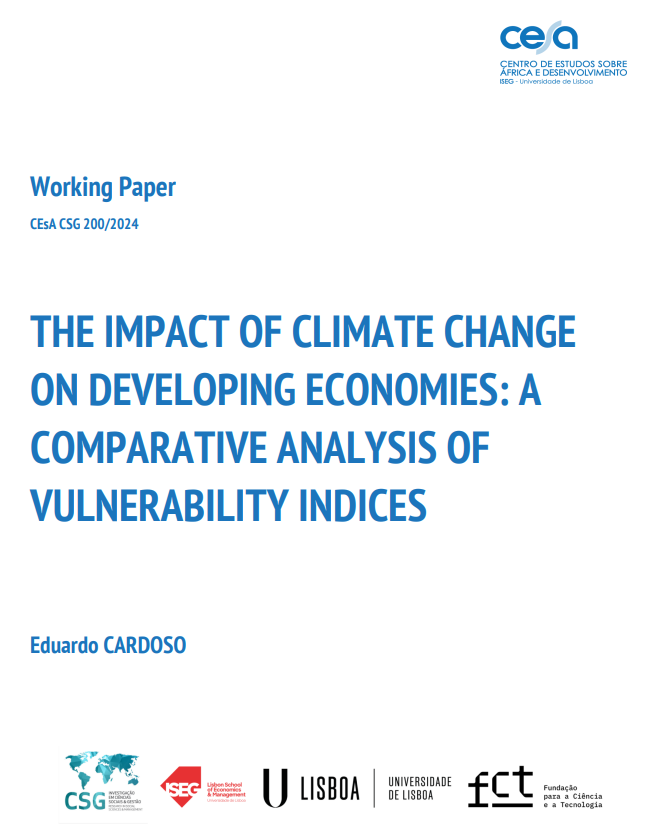
Working Paper 200/2024: The Impact of Climate Change on Developing Economies: A comparative analysis of vulnerability indices
Abstract:
In order to make informed decisions on climate finance and policies, there is an increasing need to develop an index to assess countries’ vulnerability to climate change. However, differing concepts and methodologies have led to varied views on which countries are most vulnerable and deserve more international financial support. This Working Paper examines whether key indices in climate science consistently classify countries’ vulnerability to climate disruption. It begins by reviewing literature on the impact of climate change on developing countries, followed by a comparative analysis of the EVI, ND-GAIN, INFORM, and WRI indices from 2014 to 2020. The findings indicate that while these indices are valuable for understanding and monitoring vulnerability, their differing components lead to divergent results. This research underscores the importance of a holistic approach to vulnerability assessment and calls for informed selection of indices based on specific objectives and contexts.
Cite this Working Paper:
Cardoso, Eduardo (2024). “The Impact of Climate Change on Developing Economies: A comparative analysis of vulnerability indices”. CEsA/CSG – Documentos de Trabalho nº 200/2024.
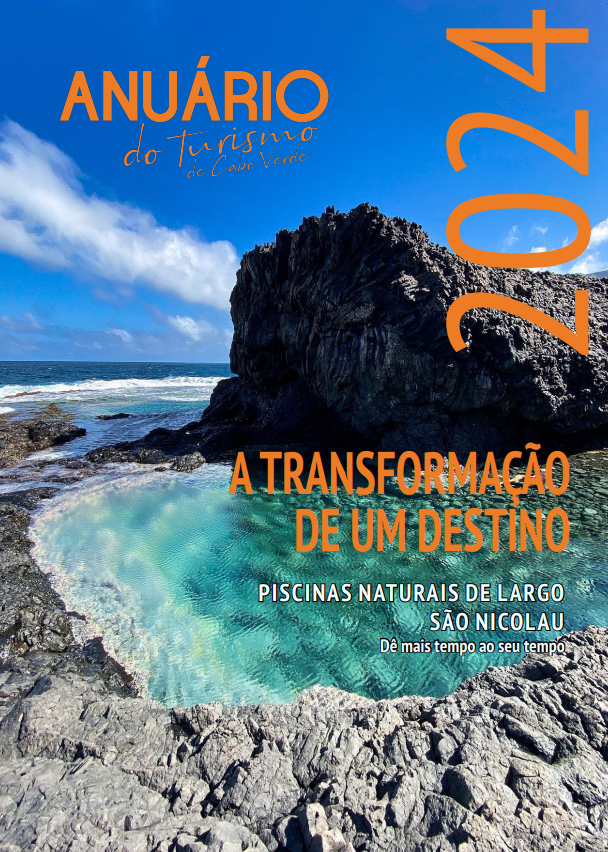
Turismo Costeiro e Marítimo em Cabo Verde. Rumo a um destino sustentável
Cite this paper:
Sarmento, E. (2024). Turismo costeiro e marítimo em Cabo Verde. Rumo a um destino sustentável. In Morgado, Carlos (2024). Anuário do Turismo de Cabo Verde 2024: a transformação de um destino (pp.30-32). Praia, Cabo Verde.
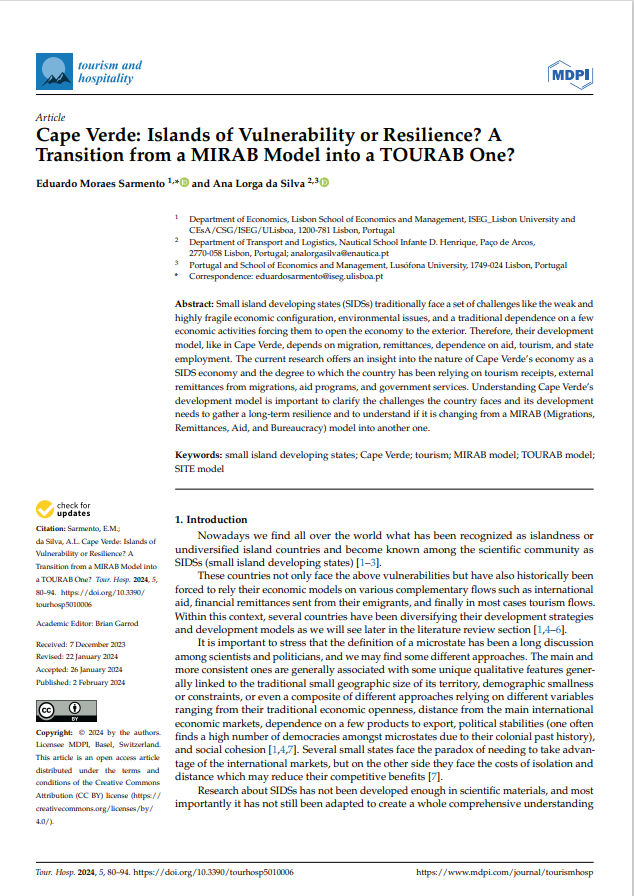
Cape Verde: Islands of vulnerability or resilience? A transition from a MIRAB Model into a TOURAB one?
Abstract:
Small island developing states (SIDSs) traditionally face a set of challenges like the weak and highly fragile economic configuration, environmental issues, and a traditional dependence on a few economic activities forcing them to open the economy to the exterior. Therefore, their development model, like in Cape Verde, depends on migration, remittances, dependence on aid, tourism, and state employment. The current research offers an insight into the nature of Cape Verde’s economy as a SIDS economy and the degree to which the country has been relying on tourism receipts, external remittances from migrations, aid programs, and government services. Understanding Cape Verde’s development model is important to clarify the challenges the country faces and its development needs to gather a long-term resilience and to understand if it is changing from a MIRAB (Migrations, Remittances, Aid, and Bureaucracy) model into another one.
Cite this article:
Sarmento, E.; Silva, Ana (2024). Cape Verde: Islands of Vulnerability or Resilience? A Transition from a MIRAB Model into a TOURAB One? Tour. Hosp. 2024, 5(1), 80-94; https://doi.org/10.3390/tourhosp5010006. MDPI. Special Edition Submit to Special Issue: Small Island Developing Countries (SIDS): Tourism between Innovation and Authenticity for Better Sustainable Developing Paths
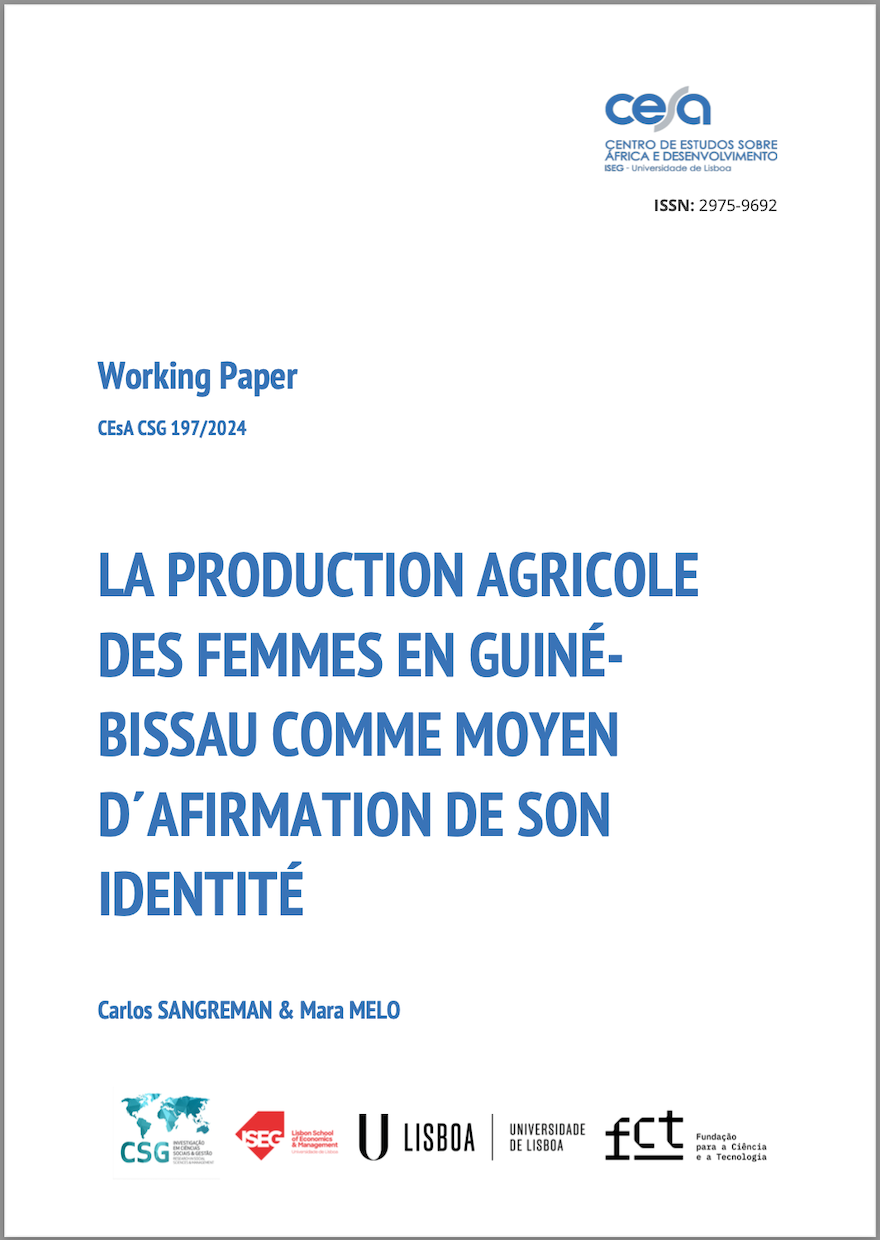
Working Paper 197/2024: La Production Agricole des Femmes en Guiné-Bissau comme Moyen d´Afirmation de son Identité
Abstract:
This working paper is an intermediate product of the study done for Swiss Cooperation in Guinea-Bissau, written in French without any point in Portuguese. What we demonstrate, as well as the principles of restitution and appropriation by the persons or institutions that access to respond to surveys or interviews, are words that do not translate into concrete actions for this Cooperation. The data were obtained by surveys and interviews in the regions of Bissau, Biombo, Bafatá, and Oio, with the producers (which also include a limited number of male producers) of leguminous agricultural products, in a sample of 160 people chosen at random. At the option of the promoter, the study focused on the marketing of products and not on production. To better understand the results, it must be said that this business model is not very profitable, but it is an activity that gives a greater independence of women in relation to men in the family space, since decisions about the use of profits belong to the producers. It also has a potential environment of action for the affirmation of the social (and not just family) identity of women that should not be despised although, as far as we can see, this is expressed for now only in the organization of associations of producers.
Cite this Working Paper:
Sangreman, C. e Melo, M. (2024). “La Production Agricole Des Femmes En Guiné-Bissau Comme Moyen D´Afirmation De Son Identité”. Instituto Superior de Economia e Gestão – CEsA/CGS – Documentos de trabalho nº 197/2024





